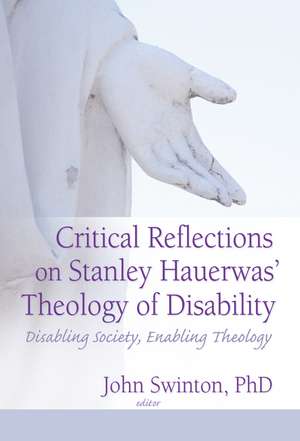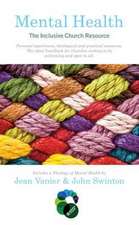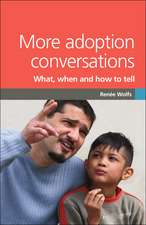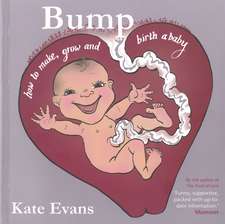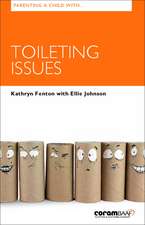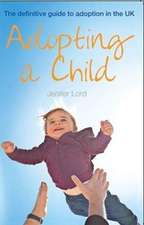Critical Reflections on Stanley Hauerwas' Theology of Disability: Disabling Society, Enabling Theology
Autor John Swintonen Limba Engleză Hardback – 7 iun 2005
Critical Reflections on Stanley Hauerwas’ Theology of Disability: Disabling Society, Enabling Theology examines the influential writings of one of the most important contemporary theologians. Over the past thirty years, Time magazine Theologian of the Year (2001) Dr. Stanley Hauerwas has consistently presented a theological position which values the deep theological significance of people with developmental disabilities, as well as their importance to the life and the faithfulness of the church. Ten key Hauerwas essays on disability are brought together in a single volume—essays which reflect and illustrate his thinking on the theology of disability, along with responses to each essay from multidisciplinary authoritative sources including Jean Vanier, Michael Bérubé, John O'Brien and Ray S. Anderson.
Dr. Hauerwas has always been a fearless voice in the field of theology. Critical Reflections on Stanley Hauerwas’ Theology of Disability: Disabling Society, Enabling Theology presents his work on the true meaning of disability and provides critical multidisciplinary discussions about his challenging ideas and their validity. In his essays, Hauerwas discusses his views on issues such as the social construction of developmental disabilities, the experience of profound developmental disabilities in relation to liberal society, and the community as the “hermeneutic of the gospel.” Included is a new essay by Dr. Hauerwas responding to the contributors to the book.
Critical Reflections on Stanley Hauerwas’ Theology of Disability: Disabling Society, Enabling Theology explores Hauerwas’ thoughts on:
- the political nature of disability in liberal society
- the creation of a society where there is more love
- the dimensions of what is “normal”
- the key role of those treated as outsiders in building community
- the theological understanding of parenting which places responsibility for the individual child firmly within the Christian community
- using the model of the church as a social ethic
- developmental disability being equated with suffering
- the concept of the person in the theology of disability
- the developmentally disabled and the criteria for “humanhood”
- the importance of family in the process of caring for people with developmental disabilities
| Toate formatele și edițiile | Preț | Express |
|---|---|---|
| Paperback (1) | 315.57 lei 6-8 săpt. | |
| Taylor & Francis – 6 iun 2005 | 315.57 lei 6-8 săpt. | |
| Hardback (1) | 1015.97 lei 6-8 săpt. | |
| Taylor & Francis – 7 iun 2005 | 1015.97 lei 6-8 săpt. |
Preț: 1015.97 lei
Preț vechi: 1536.84 lei
-34% Nou
Puncte Express: 1524
Preț estimativ în valută:
194.43€ • 202.24$ • 160.51£
194.43€ • 202.24$ • 160.51£
Carte tipărită la comandă
Livrare economică 14-28 aprilie
Preluare comenzi: 021 569.72.76
Specificații
ISBN-13: 9780789027214
ISBN-10: 0789027216
Pagini: 220
Dimensiuni: 151 x 212 x 21 mm
Greutate: 0.52 kg
Ediția:1
Editura: Taylor & Francis
Colecția Routledge
Locul publicării:Oxford, United Kingdom
ISBN-10: 0789027216
Pagini: 220
Dimensiuni: 151 x 212 x 21 mm
Greutate: 0.52 kg
Ediția:1
Editura: Taylor & Francis
Colecția Routledge
Locul publicării:Oxford, United Kingdom
Cuprins
- Foreword: A Doctor’s Debt to Stanley Hauerwas (David L. Coulter)
- Introduction: Hauerwas on Disability (John Swinton)
- Chapter 1. Timeful Friends: Living with the Handicapped (Stanley Hauerwas)
- Response: The Need of Strangers (Jean Vanier)
- Response: Making Yourself Useful (Michael Bérubé)
- Chapter 2. Community and Diversity: The Tyranny of Normality (Stanley Hauerwas)
- Response: Whose Table for “The Retarded”? (John O’Brien)
- Chapter 3. The Church and the Mentally Handicapped: A Continuing Challenge to the Imagination (Stanley Hauerwas)
- Response: The Limits of Our Practices (Jeff McNair)
- Chapter 4. The Gesture of a Truthful Story (Stanley Hauerwas)
- Response: On Discovering Saints and Making a Difference (Aileen Barclay)
- Chapter 5. Suffering the Retarded: Should We Prevent Retardation? (Stanley Hauerwas)
- Response: Thoughts on Suffering: A Parent’s View (Hazel Morgan)
- Chapter 6. Must a Patient Be a Person to Be a Patient? Or, My Uncle Charlie Is Not Much of a Person But He Is Still My Uncle Charlie (Stanley Hauerwas)
- Response: The Ground and Grammar of Personhood (Ray Anderson)
- Chapter 7. The Retarded and the Criteria for the Human (Stanley Hauerwas)
- Chapter 8. Suffering, Medical Ethics, and the Retarded Child (Stanley Hauerwas)
- A Response to Chapters Seven and Eight: Retarded Children or Retarded Ethics? (Christopher Newell)
- Chapter 9. Having and Learning to Care for Retarded Children (Stanley Hauerwas)
- Chapter 10. The Retarded, Society, and the Family: The Dilemma of Care (Stanley Hauerwas)
- Response to Chapters 9 and 10: On the Significance of Caring (Linda L. Treloar)
- Chapter 11. Reflection on Dependency: A Response to Responses to My Essays on Disability (Stanley Hauerwas)
- Index
- Reference Notes Included
Descriere
Critical Reflections on Stanley Hauerwas' Theology of Disability: Disabling Society, Enabling Theology examines the influential writings of one of the most important contemporary theologians. Over the past thirty years, Time Magazine Theologian of the Year (2001) Dr. Stanley Hauerwas has consistently presented a theological position which values the deep theological significance of people with developmental disabilities, as well as their importance to the life and the faithfulness of the church. Ten key Hauerwas essays on disability are brought together in a single volume—essays which reflect and illustrate his thinking on the theology of disability, along with responses to each essay from multidisciplinary authoritative sources including Jean Vanier, Michael Bérubé, John O'Brien and Ray S. Anderson.
